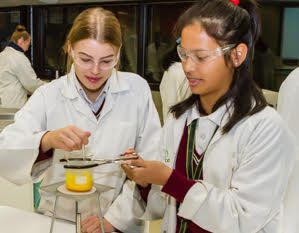
The Scientific Method
Students will explore the steps involved in designing an experiment correctly by working through a series of interactive activities, videos and games.This course is intended to introduce students to the correct way of designing an experiment. Using the scientific method regularly will teach students to look at all the evidence before making a statement of fact. This is an integral part of science education. If we want our students to be prepared for higher education science, they must have a sound understanding of the scientific method process. In a nutshell, the scientific method teaches the brain to logically examine and process all the information it receives. It requires that one observes and tests before making a statement of fact. This is the main method scientists use when asking and answering questions.
Background Information:
We are constantly exposed to claims in the media that assert to be scientific such as:
- Our product is scientifically proven to work
- Our product is better because its free of chemicals
People generally trust scientific authority but don’t necessarily understand how science actually works. Unless you understand how science works, how can you know whether or not to trust the scientific claims?
Year Level: 5 – 10
Prior Knowledge:
There is no prior knowledge necessary
Course Connections:
This course builds understanding of an integral area of scientific exploration.
Learning Intentions:
In this program, the students will:
- Become familiar with the steps involved in the scientific method
- Learn how to write an hypothesis
- Distinguish between independent and dependent variables
- Determine the best way to display different types of data
- Develop accurate conclusions
Estimated Duration: 60 minutes
Victorian Curriculum:
Science – Scientific Understanding
- Scientific knowledge and understanding of the world changes as new evidence becomes available; science knowledge can develop through collaboration and connecting ideas across the disciplines and practice of science (VCSSU089)
Science – Science as a human endeavour
- Science and technology contribute to finding solutions to a range of contemporary issues; these solutions may impact on other areas of society and involve ethical considerations (VCSSU090)
Science – Questioning and predicting
- Identify questions, problems and claims that can be investigated scientifically and make predictions based on scientific knowledge (VCSIS107)
Science – Planning and conducting
- In fair tests, measure and control variables, and select equipment to collect data with accuracy appropriate to the task (VCSIS109)
Science – Analysing and evaluating
- Use scientific knowledge and findings from investigations to identify relationships, evaluate claims and draw conclusions (VCSIS111)
- Reflect on the method used to investigate a question or solve a problem, including evaluating the quality of the data collected, and identify improvements to the method (VCSIS112)
Science – Communicating
- Communicate ideas, findings and solutions to problems including identifying impacts and limitations of conclusions and using appropriate scientific language and representations (VCSIS113)
Course Creators: Jo Tate & Carol-Anne Glynne
